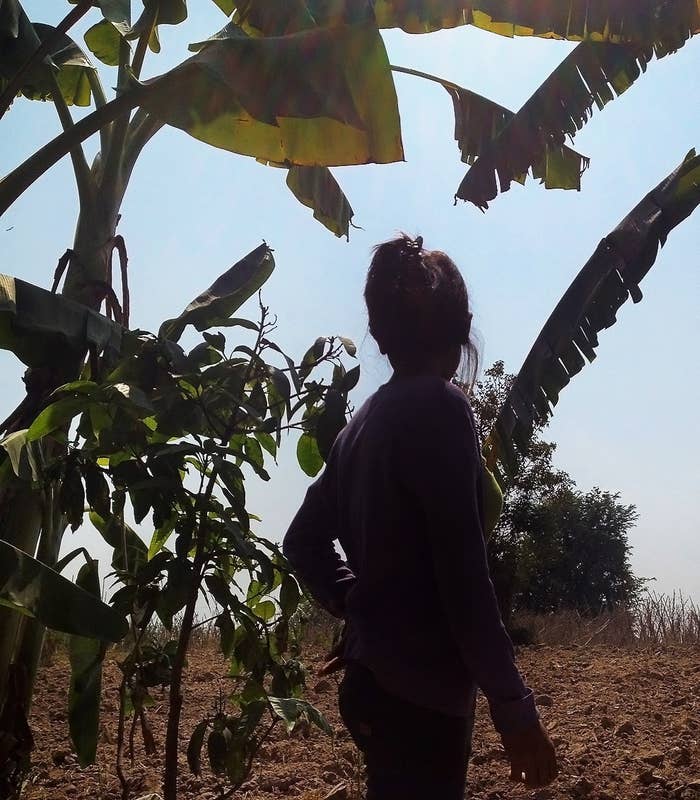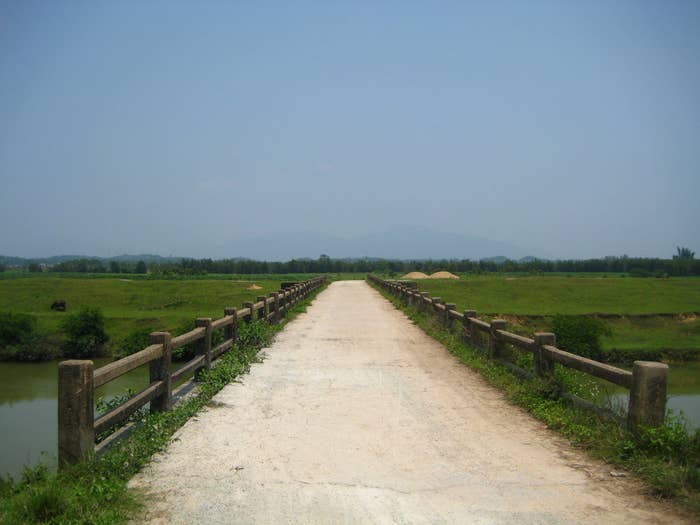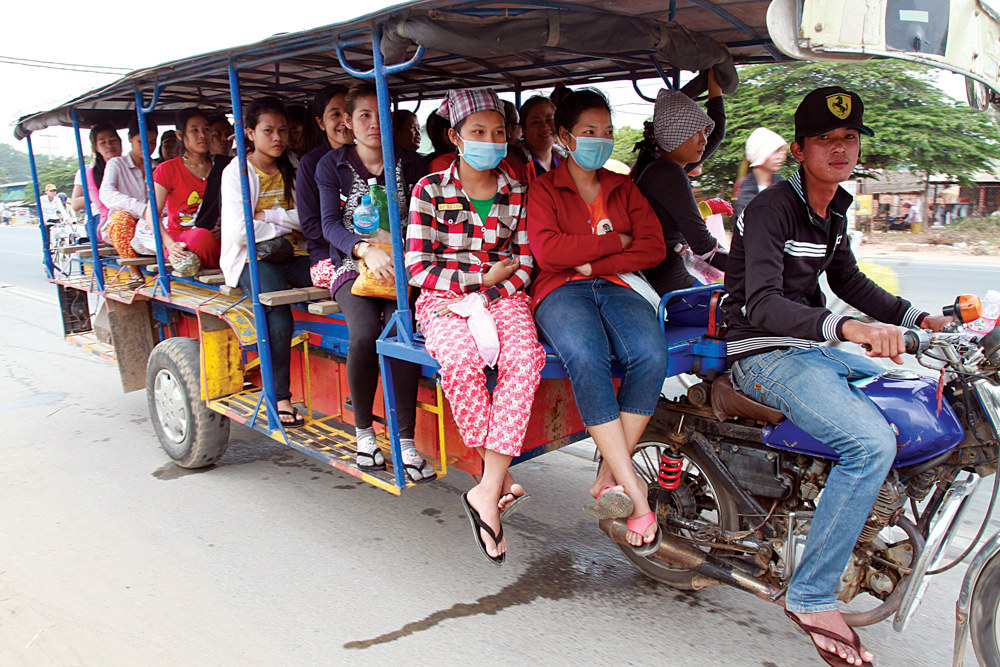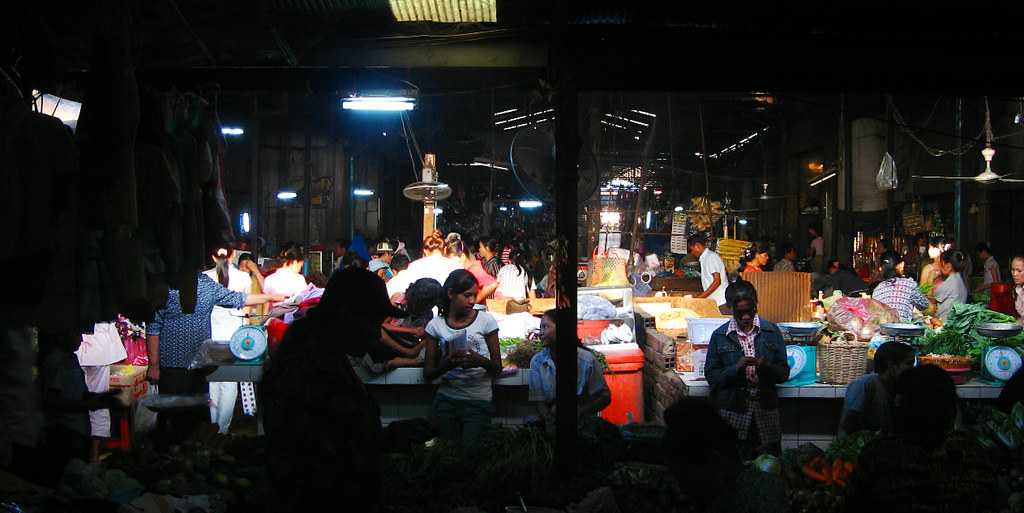
PHNOM PENH, Cambodia — Khai Sochoeun went willingly, above all, because she wanted a job. The two women who brokered the deal — who pushed the paperwork, bought the plane tickets, and arranged the airport pickup on the other side — also mentioned marriage. Chinese husbands are rich, they told her. A good Chinese husband can mean good fortune for a poor Cambodian family like hers.
If a husband came, so be it, but it was the work she was interested in. She was 29, and she'd spent most of her life as a day laborer, with her father and her seven siblings, on the rice paddies that surround her house, more than an hour from the Cambodian capital. They seeded and replanted young rice shoots and plucked ripened grains, under sun that's either hot or unbearable, depending on the season. But Khai had seen Chinese soap operas, and she knew there was better work in a world not too far away — long hours, probably, and maybe tedious, but in tall office buildings with elevators and air conditioners and rich, maybe even kind, bosses.
"When I watch TV, they never show farmers in rice paddies. They just have men in big businesses, running companies," Khai said, sitting on a bamboo mat at her home.
So she was shocked, after an overnight drive from the Baiyun Guangzhou airport in southern China, to find herself surrounded by rice fields. (Khai had no idea at any point during her experience where exactly in China she was, but the airport name is marked in the entry and exit stamps in her passport and were translated by BuzzFeed News.)
"It was just like home — and very remote, even more remote than my home," she told BuzzFeed News. "I felt confused. I felt very disappointed. I thought I would be in a beautiful city, with plenty of jobs with high wages, plenty of rich husbands.
"The reality was, they were just poor farmers, like Cambodians," she said.
Khai is one of many single, mostly young Cambodian women who have been trafficked to China as brides since 2013. Thanks to China's infamous one-child policy, experts say, there are more single men than women in the country, and as those men age, they seek marriageable women.
For years, traffickers met that demand with women from Vietnam. But Vietnam has recently tightened its marriage rules and waged an information campaign to combat the problem. For traffickers, Cambodia has emerged as an attractive alternative. With fewer regulations and no awareness among Cambodian women about the risks, business has been easy. The going rate for a foreign bride is between $10,000 and $15,000, though the prettier you are judged, the more money traffickers can charge.
"If she's a beautiful lady, young with white skin, they can charge the Chinese man around $20,000," said Chhan Sokunthea, who heads the women's and children's section of the local human rights and legal aid organization ADHOC (the acronym stands for Cambodian Rights and Development Association). "If she's not a beauty, less," she said. "The broker … sells her like a pig or a duck."
In 2013, Cambodian rights organizations, including ADHOC, received the first complaints from women like Khai, kept as domestic slaves in their husbands' homes, separated from their passports, and forced to marry. In 2014, those numbers soared, and three local organizations handle complaints, often filed by family members, for more than 150 women stuck in China, some of them (a minority) forced to work in brothels or "service" the friends of their husbands.

When Khai agreed to move to China, at her uncle's suggestion, she didn't do it on a whim. She listened to a popular independent radio station called Beehive, where women who had had bad experiences in China told their stories. But she also sat face-to-face with women in her uncle's village, women who had gone to China and come back. "I didn't take a risk without getting information," she said.
The women who'd returned insisted, "'China's great.' They told me, 'If you don't like the men, you can ask to come back.' So I decided, if I don't take a risk, I won't get any benefit," she said.
"It's not just me," she continued. "Other girls from poor families, when they hear about good jobs or husbands, they think about it seriously." Young Cambodian women have few high-wage job prospects, but they face tremendous pressure to contribute financially to their families. Roughly 40% of Cambodians live on less than $2 a day, according to the World Bank's most recent country estimate.
And it's often a family member that suggests moving to China to fulfill those pressures. In Khai's case, her uncle brought up China after she sought his advice on finding better-paying work. She wasn't interested, she said, but "he kept lobbying me. 'If you want to marry a Chinese man, you would be a good woman because you can send money home to your family,'" he told her. When she relented, he introduced Khai to her traffickers.
Khai doesn't know if money changed hands between them, and she kept her decision a secret from the rest of her family until mere hours before her departure for the airport. "My father," she said, "was so angry."
The United Nations Inter-Agency Project on Human Trafficking (UNIAP) says it's common for the traffickers, who rely on networks of trust to win recruits, to pay the family member who introduces the idea.
Khai only knew her traffickers as Yeay Soeung (meaning "Grandma Soeung," a prefix showing respect for elders) and Ming Mao ("Auntie Mao"). But she said she felt more at ease because they were Cambodian women. "If they were men, I would not have any trust in him. Girls trust women. That's why they use women as ringleaders."
The Cambodian League for the Promotion and Defense of Human Rights, known by the acronym LICADHO, says in the cases it handles, women are most often the "brokers" who convince potential victims to make the move. Men, meanwhile, grease the bureaucratic wheels needed to get the proper paperwork, especially the passport. That document usually costs $135 and takes a month, according to the Cambodian government. But if you top it up by paying a bribe, things can more faster. "For $800 or $1,000, you can get it very quickly," said Sem Chausok, who runs the anti-trafficking program at LICADHO.
Khai doesn't know how much her traffickers paid for her passport, but she said only a week elapsed between her first meeting with them and the June 8, 2013, issue date of her passport. Two weeks later, she incurred the wrath of her father by deciding to leave over his objections, and she bid a tearful good-bye to her sister at the Phnom Penh Airport, more than an hour away.
At the airport in China, she and two other women, both younger than her, waved a Cambodian flag to identify themselves to their next set of traffickers, four Chinese men and a Cambodian woman, whom Khai called "the ringleader." After an overnight drive to what felt to Khai like the middle of nowhere, they were kept in the woman's house. "We belonged to the ringleader," she said, "so we stayed at the ringleader's house." They relaxed for a day, and then they were told to primp and come downstairs, where Khai found a man and five or six of his female relatives.
"I thought they were visitors," she said. "I didn't know they were picking out a girl to marry." But then the ringleader lined them up, and she realized what was happening. "The two other girls looked prettier than me, so they were chosen right away."
As other men visited, Khai resisted. She wanted a job, she says, not a marriage. But her tourist visa was only good for 45 days, and the ringleader held her passport. "She told me I had to marry the next man who came, or she would abandon me on the street, and I would have nothing to prove I was there legally."
Khai also didn't speak the language, so she would have been helpless to find and explain her situation to the Chinese authorities. She didn't know where she was, or how to find the Cambodian embassy. And she didn't have the $3,000 the ringleader demanded when Khai said she wanted to go home.
Still she refused and begged to be sent home. She thought she'd made the ringleader crack at one point, but the four Chinese male traffickers hardened their stance. Khai counted the days left on her visa and then, finally, "forced myself to agree."

The man Khai was forced to marry wasn't handsome, she said, but he wasn't ugly. "He was fine. He was like the other guys," she said. She was more worried about whether he would be kind, but she couldn't tell. She didn't understand a word he was saying. She couldn't even tell how old he was. "But whenever he turned his face to me, he smiled," she said. So she had some hope.
It was short-lived. Just after they registered their marriage with Chinese officials — at least, that's what she was told they were doing; she had no way to know, and no ceremony or other indication that she had, in fact, been married to him — she was turned into a domestic slave, waking up early to do all the housework. Though they lived with six other people, including his mother, no one helped her. Her husband also beat her.
And though this is not the word she uses, she was raped repeatedly by her husband. "He was always forcing me to sleep with him," Khai said, "even though I don't have feelings for this." Sometimes she was able to resist, but the man called the ringleader to complain. "She said I have to sleep with him or I will be dumped on the street." She also told Khai that if she wouldn't do as he asked, no one could guarantee her safety inside his home.
So Khai negotiated. She said she'd agree to sex without complaints if the ringleader would bring her a phone with a Chinese SIM card, so that she could call her parents. The ringleader obliged, and Khai immediately called Beehive radio — the independent Cambodian station that had broadcast stories of women trapped in China, and whose number Khai had copied down and brought with her to China. The station told her it couldn't help, but it gave her the telephone number for LICADHO, which gave her the contact number for the local Cambodian consulate.
Officials at the consulate asked her where she was, but she didn't know. Instead, she gave them the name and telephone number of the ringleader. A few days later, the ringleader called Khai to complain.
"I got a call from some Cambodian official saying I have a business making good money selling Cambodian women!" the ringleader shouted. "If you want to complain, why don't you come to me?"
Khai reminded her that she'd done just that. "And you just force me to sleep with this man who beats me up," she said. The ringleader insisted Khai withdraw her complaint. Khai agreed — if the ringleader agreed to send her home, free of charge.
Khai said that on Aug. 11 she was given a piece of paper with a single sentence saying that she'd agreed to withdraw her complaint. The rest of the page was blank, and she was told to ink the bottom with her thumb. "I don't know what they wrote on the rest of the paper," she said. "It could be anything. I didn't care."
She got in the car for the long drive to the airport. This time, it was daylight, and as she moved through the rural Chinese countryside, she felt uneasy. "I just kept praying to the ancestors to help me, that I wasn't being tricked again, that I was really on my way home." Once she saw tall buildings and heard airplanes coming in to land, she knew it was true.
And that's how Khai got back to Cambodia. Most repatriated women fly on tickets bought by donors or by their families, according to the Cambodian government. but Khai outsmarted her trafficker in China — and stuck the woman with the bill. "I'm proud of myself, that I figured out how to get back without paying," she said. "My family is too poor, they could never have afforded to help me. I feel very proud of myself for that."

Khai knows her story is not typical. She says she's "luckier" than most Cambodian women stuck in China. There were no other men in the house where she was trapped, although other repatriated women have reported being forced to sleep with the brothers, uncles, and even fathers of their husbands, according to local human rights organizations. Some women have told local human rights advocates that their husbands sent them to work in brothels, which seems to be more common with women who are found to be infertile.
Many of the women who are repatriated, with money from the International Organization for Migration (IOM), from the Christian nongovernmental organization World Vision, or from smaller NGOs or private donors, return home pregnant. Most stay silent, doubly stigmatized by the suspicion of neighbors that they've been raped or otherwise abused and by the "failure" of a marriage, still a sacred institution in Cambodia.
In 2013, the Cambodian government said it assisted in repatriating 21 women from China. In 2014, it repatriated 58, with costs covered either by the IOM, local or international NGOs, or the women's own families, said Koy Kuong, the spokesperson for the Foreign Ministry. Three local NGOs, meanwhile, fielded complaints for more than 150 women whose families reported them victims of bride trafficking.
The Cambodian government's latest tally represents a dramatic increase in repatriations. In August, the ministry released a statement saying it had repatriated only 18 women so far that year. Kuong's just-released annual figures would mean the ministry repatriated 40 women between September and December — more than doubling its rate of assistance and return in the last third of 2014. But Kuong said the increase did not reflect any new or reinvigorated push, that he was aware of, by the ministry to work on the problem and that the issue is a year-round concern.
The Cambodian Foreign Ministry says it's also taking steps to curb this new trafficking trend. It has pressured the Chinese Embassy in Phnom Penh to restrict visas to young, single women, in particular by requiring them to deposit $10,000 in a Chinese bank prior to receiving a tourist visa, a change it announced last August. Visalo Long, the second-highest-ranking official in Cambodia's Ministry of Foreign Affairs and International Cooperation, said the sum is meant to ensure a trafficked woman can be bought a ticket home. The United Nations and local rights groups say it's unfair discrimination against women and question whether it will make much difference. (The Chinese Embassy in Phnom Penh did not respond to repeated requests for comment.)
But Visalo admits corruption, which seems to aid this form of trafficking at every step, can creep in here: There aren't necessarily controls in place to make sure the woman, herself, is depositing the cash, nor that the receipt is kept in the woman's name. It may also be possible, with a few greenbacks, to use the same deposit slip for more than one application.
The Cambodian side of the trafficking process is susceptible to corruption too, Visalo said. From getting the passport to proving a woman is single and therefore eligible to marry, a lot can be done with a little bit of cash. "If they give money, it's finished. The police stamp, 'OK, 'OK,'" he said.
Rights organizations say Cambodia's embassy and consulates in China sometimes issue certificates of "marriagibility," affirming the single status of the trafficked woman, prior to her marriage. Visalo denied that embassies or consulates do this. "Our consulates receive the instructions from me that they will not do [this paperwork for] anybody," he said. The more difficult problem to tackle, he said, are traffickers arranging counterfeit documents in Cambodia and simply having them translated in China. (Khai's documentation was issued under a fake name, after her traffickers bribed a local record-keeper to provide what amounts to a false birth certificate.)
Visalo also told BuzzFeed News that the Cambodian government, like local groups and even the United Nations, doesn't have a clear picture of the scope of the problem. There simply aren't any comprehensive statistics yet. But Visalo suspects there are hundreds, if not thousands, of women moving to China with the promise of marriages that will make their families wealthy — and that those that end in forced marriages or other forms of coercion are only a small percentage. "If there are no problems," he said, "you never hear about the case."
Political sensitivities may also be obscuring the problem. In China, bride-buying has been a long-term problem, and the country is sensitive about the topic, making it difficult to research or to discuss in official meetings.
IOM calls these cases "marriage migration," eschewing the vocabulary of trafficking. Only one of the three local NGOs working on the issue classifies these cases as "sex trafficking," and it does so because women so often end up forced into sexual exploitation, inside or outside their marriage. Others, including the Cambodian government, categorize it generally as trafficking.
Annette Lyth, regional project manager of the U.N.'s anti-trafficking program, told BuzzFeed News that the international protocol on trafficking says, essentially, it doesn't matter. "It doesn't matter what you consented to in the beginning. If you were tricked or lured into an exploitative situation ... or given the wrong information ... it's still trafficking," Lyth said.
Khai, meanwhile, wants to make sure other women don't fall victim to the same bad information she received, even if that means neighbors and family friends judge her. When she came home, in one of the first groups of women to get repatriated, she told her family and her neighbors that she'd been forced to marry and had been abused. She has no patience for stigma, and she doesn't know, or care, if her neighbors talk about her behind her back. "That kind of discrimination can be eliminated if we tell the truth," she said. "I just want to help other women."
These days, she doesn't mind working alongside her aging father and some of her siblings, in the rice fields. Even under the sun in the hot season. "I just want to stay close to my family," she said.
